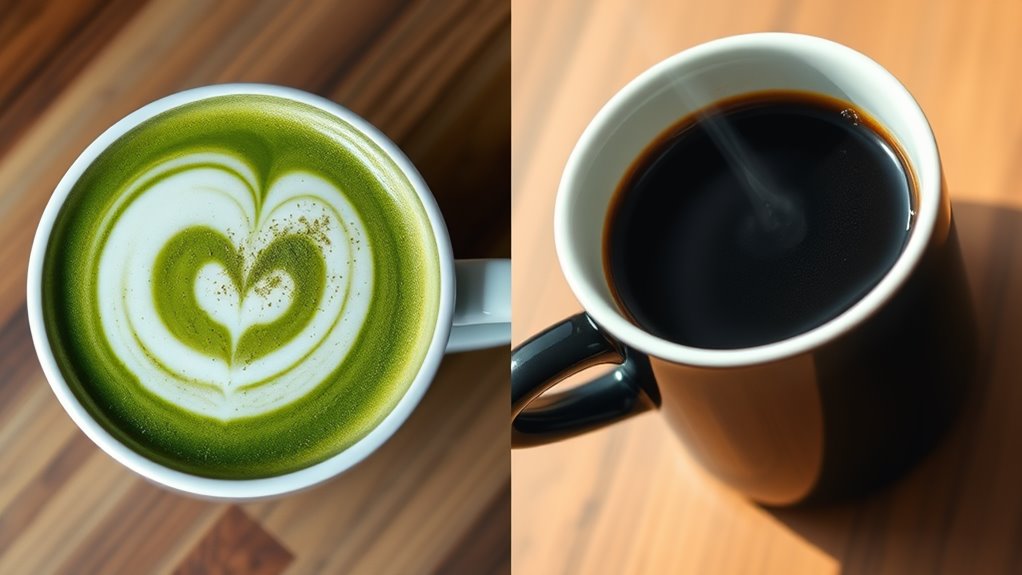When comparing matcha and coffee, each has unique energizing benefits. Matcha provides a calm, sustained energy boost due to its lower caffeine content and L-theanine, promoting focus without jitters. In contrast, coffee delivers a quick energy spike and enhances cognitive function, but it can lead to anxiety for some. Both are rich in antioxidants; matcha has more catechins, while coffee boasts chlorogenic acids. Your choice ultimately depends on your lifestyle and preferences. If you're curious about what else these popular beverages can offer, stick around for a closer look at their effects!
Key Takeaways
- Matcha provides a sustained energy release with calming effects due to L-theanine, promoting focus without jitters.
- Coffee delivers a quick energy spike, enhancing cognitive function and boosting alertness effectively.
- Matcha has lower caffeine content than coffee, making it a gentler option for prolonged energy without crashes.
- Both beverages contribute to antioxidant intake, with matcha offering higher catechin levels compared to coffee's chlorogenic acids.
- Personal lifestyle factors, such as health goals and daily routines, significantly influence the choice between matcha and coffee for energy.
Nutritional Profiles Comparison
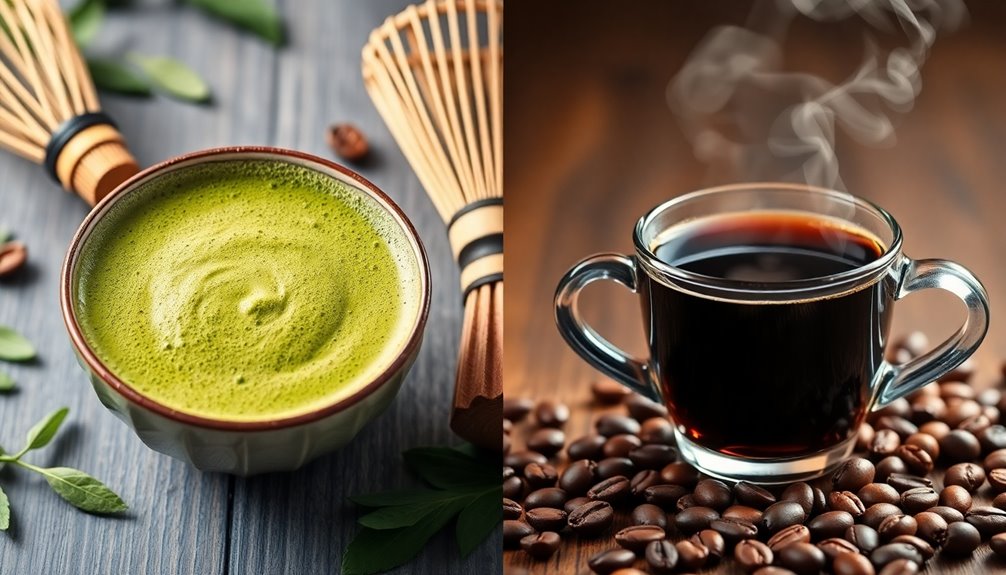
When comparing the nutritional profiles of matcha and coffee, you'll often find that both beverages offer unique benefits. Matcha, a finely ground powder made from specially grown green tea leaves, boasts a higher antioxidant content than coffee. These antioxidants, particularly catechins, can help combat oxidative stress and improve overall health. In contrast, coffee's antioxidants, primarily chlorogenic acids, also provide health benefits but in a different way. Both drinks contribute positively to your daily antioxidant intake, enhancing your well-being.
Now, let's talk about caffeine levels. Matcha generally contains less caffeine than coffee, with about 70 milligrams per serving compared to 95 milligrams in an 8-ounce cup of coffee. However, the caffeine in matcha is released more gradually, thanks to the presence of L-theanine, an amino acid that promotes relaxation without drowsiness. This means that while you get a caffeine boost from both beverages, your experience with each may differ significantly. Additionally, consuming caffeine in moderation can improve your athletic performance(https://www.example.com) and enhance your workout efficiency.
Energy Release Mechanisms
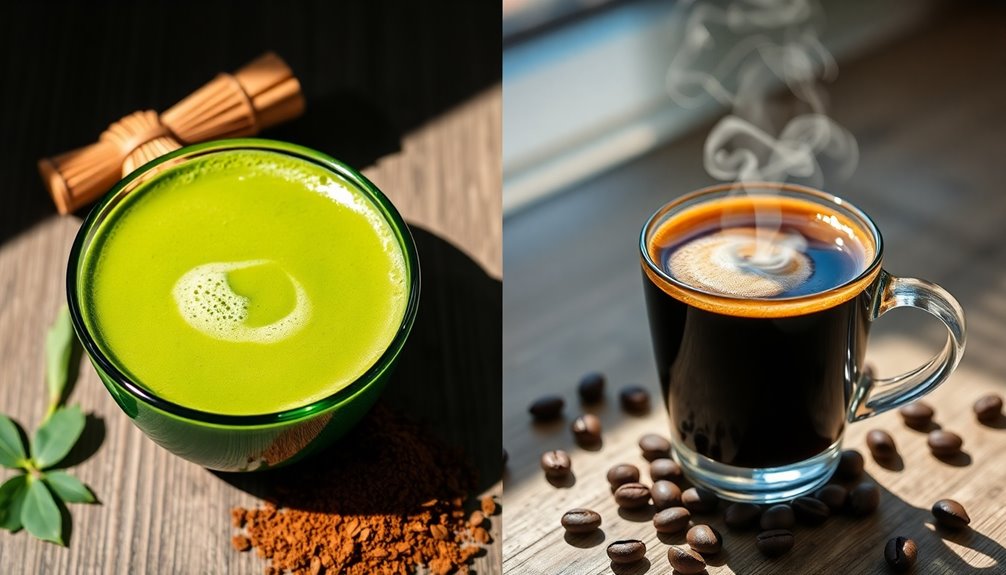
How does the body respond to the energy released from matcha and coffee? Both beverages have unique mechanisms that influence how you experience their energizing effects. Understanding these mechanisms can help you choose which one suits your lifestyle better.
When you consume coffee, the caffeine rapidly enters your bloodstream, providing a quick energy boost. This is due to its faster caffeine metabolism. In contrast, matcha releases energy more gradually, thanks to its unique combination of caffeine and L-theanine, which promotes a state of calm alertness. This difference in energy release can affect your productivity and focus throughout the day. Additionally, incorporating the Smoothie Diet can offer a versatile approach to enhancing your energy and overall health.
Here's a comparison of their energy release mechanisms:
| Feature | Matcha | Coffee |
|---|---|---|
| Caffeine Content | Moderate, slower release | High, rapid release |
| L-Theanine | Present, promotes calm focus | Absent |
| Duration of Energy | Sustained, steady energy | Short-lived, quick spike |
| Antioxidant Effects | High, beneficial for health | Moderate, offers some benefits |
| Side Effects | Fewer jitters | Jitters and crashes possible
Health Benefits Overview
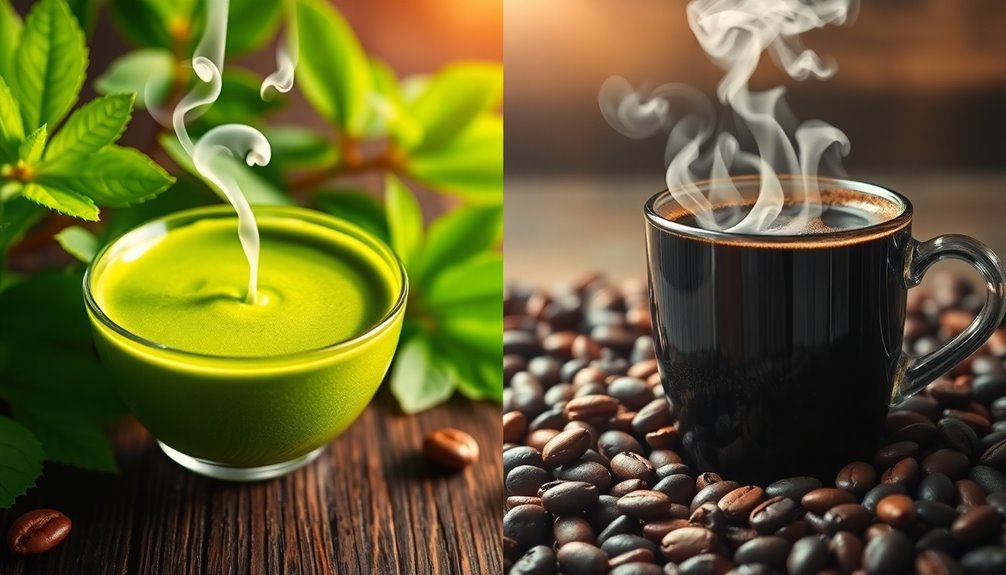
As you explore the health benefits of matcha and coffee, you'll find that both beverages offer unique advantages that can enhance your well-being.
Matcha, a finely ground green tea, is rich in antioxidants, particularly catechins, which can help combat oxidative stress in your body. These antioxidant benefits may contribute to improved heart health and enhanced immune function, making matcha a powerful ally in your wellness journey.
On the other hand, coffee is known for its caffeine content, which can provide a quick energy boost and improve cognitive function. The caffeine in coffee can also aid in metabolism boosting, potentially helping you maintain a healthy weight. Studies suggest that regular coffee consumption is linked to a reduced risk of certain diseases, including type 2 diabetes and Parkinson's disease.
However, it's crucial to take into account the effects of both beverages on your mental health. Matcha tends to promote anxiety reduction due to the presence of L-theanine, an amino acid that encourages relaxation without drowsiness. In contrast, while coffee can enhance alertness, excessive consumption may lead to increased anxiety for some individuals.
Ultimately, deciding between matcha and coffee depends on your personal preferences and health goals. By understanding their unique health benefits, you can make informed decisions that align with your lifestyle, fostering a sense of belonging to a community that values wellness and mindful consumption. Additionally, both beverages can be included in a plant-based diet, which is known for its significant health benefits and nutrient density.
Flavor and Preparation Styles
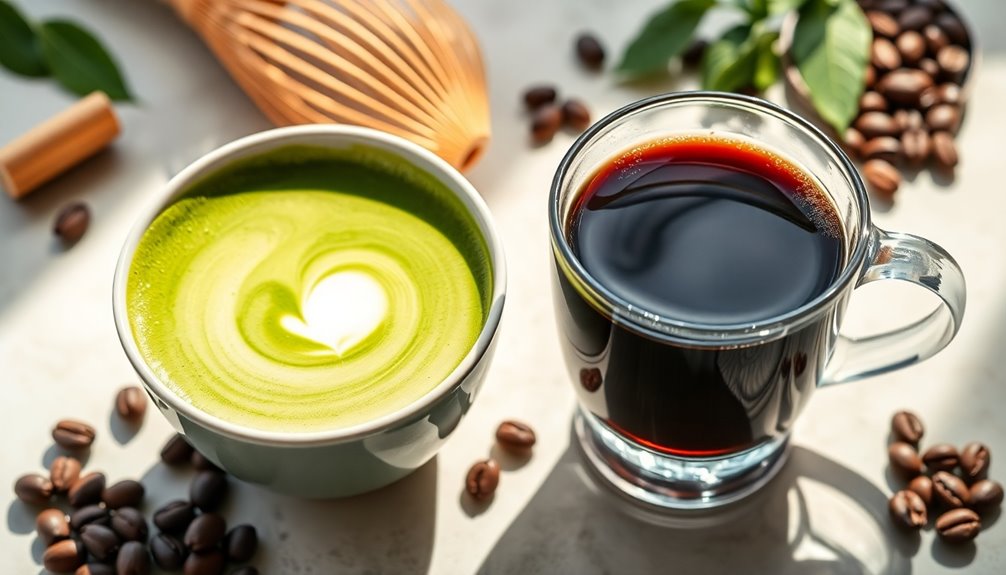
The flavor profiles and preparation styles of matcha and coffee offer distinct experiences that cater to different palates and preferences. Matcha, a finely ground green tea powder, delivers a rich, grassy flavor with a hint of sweetness. Its taste can vary depending on the quality, with ceremonial-grade matcha providing a smoother, more delicate experience compared to culinary-grade options.
Coffee, on the other hand, presents a wide range of flavors influenced by factors like bean origin, roast level, and brewing methods. From fruity and bright to bold and chocolatey, coffee can cater to diverse taste preferences.
When it comes to brewing methods, the two beverages also differ significantly. Matcha is prepared by whisking the powder with hot water, creating a frothy, vibrant drink. This simple method emphasizes the freshness and quality of the matcha.
In contrast, coffee offers a plethora of brewing options, including French press, pour-over, espresso, and cold brew. Each method extracts unique flavors and aromas, allowing for customization to suit individual preferences.
Ultimately, whether you lean towards the earthy notes of matcha or the complex layers of coffee, both beverages invite you to explore their distinct characteristics. Understanding these flavor profiles and preparation styles can enhance your appreciation and help you choose the right drink for any occasion. By experimenting with different types and methods, you'll find the perfect fit for your taste preferences and enjoy a sense of belonging within each beverage's community. Additionally, incorporating protein-packed vegan smoothies into your routine can help boost energy levels and enhance your overall wellness.
Personal Preferences and Lifestyle
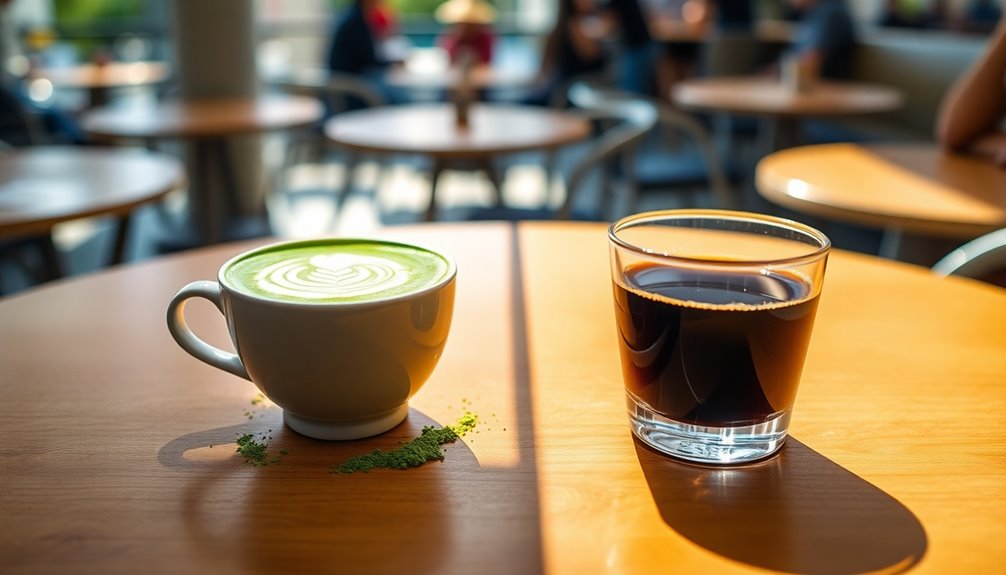
When choosing between matcha and coffee, personal preferences and lifestyle play significant roles. Your morning routine, for instance, can greatly influence which beverage you opt for. If you enjoy a quick, robust cup of coffee to kickstart your day, that familiar aroma might be hard to resist. Coffee's caffeine content often provides an immediate boost, making it a go-to for many looking to enhance work productivity right off the bat.
On the other hand, if you prefer a more mindful approach, matcha could be your ally. The process of preparing matcha—whisking the vibrant green powder into hot water—can become a calming ritual that sets a positive tone for your day. Many find that the sustained energy from matcha, which is released more slowly due to its L-theanine content, helps maintain focus throughout the workday without the jitters coffee sometimes brings.
Consider your lifestyle too. If you're frequently on the go, the convenience of grabbing a coffee might suit you better. However, if you prioritize health and wellness, incorporating matcha into your routine might align more with your values. Additionally, drinking water from SlimCrystal bottles can help boost your energy levels and improve overall health.
Ultimately, it comes down to what feels right for you. Both beverages offer unique benefits, and your choice can reflect your personal style and how you want to energize your day. Whether you're brewing a cup of coffee or sipping on matcha, make it a choice that resonates with your lifestyle and goals.
Frequently Asked Questions
Can Matcha Be Consumed in a Powdered Form Without Brewing?
Yes, you can consume matcha in powdered form without brewing it. Instant matcha is a convenient option that retains many matcha benefits, like antioxidants and energy-boosting properties.
Simply mix the powder into smoothies, yogurt, or even water for a quick nutrient boost. This way, you still enjoy the rich flavor and health advantages of matcha without the need for traditional brewing methods.
It's an easy addition to your daily routine!
Does Coffee Have Any Impact on Hydration Levels?
You might think coffee's the ultimate hydration villain, but that's not entirely true! While caffeine levels in coffee can lead to mild diuretic effects, research shows its hydration effects aren't as drastic as once believed. In moderation, coffee can contribute to your daily fluid intake.
Are There Specific Dietary Restrictions for Consuming Matcha or Coffee?
When considering dietary restrictions for matcha or coffee, ponder their nutritional content. Matcha's high antioxidants can benefit those avoiding caffeine, while coffee provides energy boosts. If you're sensitive to caffeine, you might want to limit coffee.
Both beverages have unique health benefits, but if you're on a special diet, check for additives or allergens. Always consult a healthcare professional if you're unsure about their impact on your health.
How Do Matcha and Coffee Affect Sleep Patterns Differently?
Caffeine sensitivity and bedtime routine play key roles in how matcha and coffee affect sleep patterns. While coffee can disrupt your sleep quality due to its higher caffeine content, matcha offers a gentler boost, often leading to more stable energy levels without the crash. If you're sensitive to caffeine, opting for matcha might enhance your night's rest. Ultimately, understanding how these beverages impact you personally can help you make better choices for your sleep health.
Can Matcha or Coffee Help With Weight Loss?
Both matcha and coffee can aid in weight loss. They offer a metabolism boost, enhancing calorie burn. Coffee's caffeine can increase your energy levels, making it simpler to stay active.
On the other hand, matcha provides appetite suppression, assisting you in resisting those cravings. Both beverages can be included in a balanced weight loss strategy, but it's crucial to pair them with a nutritious diet and consistent exercise for optimal outcomes.
Conclusion
In the battle of matcha versus coffee, both have unique benefits that cater to different needs. While coffee provides a quick energy boost, matcha offers a more sustained release, thanks to its L-theanine content. Ultimately, it comes down to personal preference and lifestyle. As the saying goes, "You can't have your cake and eat it too." Choose the superfood that aligns with your goals, and enjoy the energizing benefits each offers in moderation.

